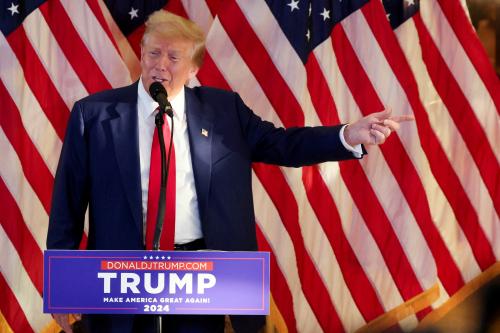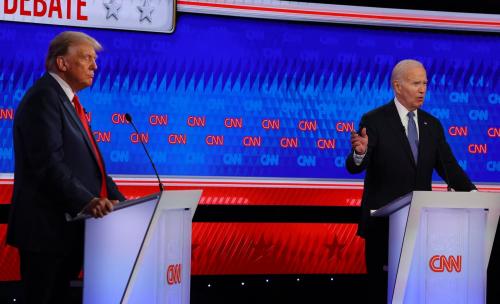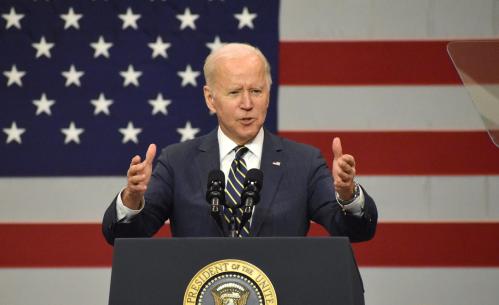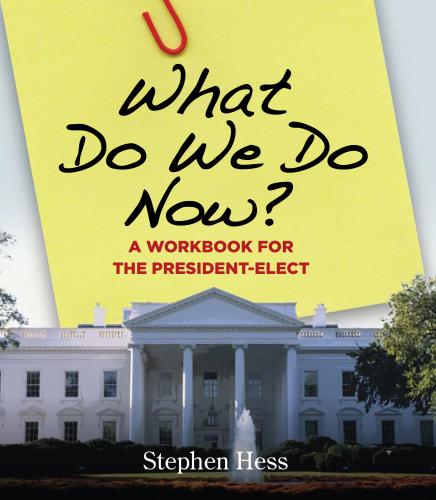As the 100th day of the Biden presidency approaches, here’s the long-term weather report: mostly sunny now, but with increasing clouds and a chance of storms later. Following is a review of some important data from five major polls.
By most measures, Joe Biden has gotten off to a strong start. His overall job approval has been rock-solid at 53% while disapproval has stabilized at around 41%. According to the Pew Research Center, 72% of Americans give him high marks for the manufacture and distribution of the Covid vaccine, and 67% approve of his COVID-19 aid bill, which Congress enacted in March. Other high-quality surveys have yielded similar results.
Mr. Biden’s proposed American Jobs Plan—often but misleadingly called his “infrastructure” bill—enjoys solid though not overwhelming public support, which increases when people are told that it will be financed with higher taxes on corporations and wealthy individuals. The most recent Marist poll vindicates the president’s political instincts: only 3 in 10 Americans would support an increase in tolls or the gas tax to pay for infrastructure improvements, and only 2 in 10 would favor a general tax increase or increased borrowing to do so.
Mr. Biden also gets high marks for his personal attributes. Forty-six percent of Americans like the way he conducts himself as president, Pew finds, compared to just 27% who dislike his conduct. (The remaining 27% have mixed views.) Forty-four percent believe that he has changed the tone of political debate for the better, while 29% disagree.
Not surprisingly, Mr. Biden scores highest on empathy: 58% in a Quinnipiac poll believe that he cares about average Americans—people like them. Smaller majorities see him as honest, a strong leader, and a uniter rather than a divider.
And the president has forged unprecedented unity within his party. Ninety-six percent of Democrats approve of his job performance, Gallup finds, a higher level of intra-party support than presidents Trump, Obama, George W. Bush, and Clinton enjoyed at a similar point in their administrations.
Overall, a recent Monmouth survey finds, 46% of Americans believe that the country is heading in the right direction, the highest share in more than a decade. This is a promising foundation for the Biden administration’s future initiatives.
Now for the clouds. The flipside of party unity is partisan division. The gap between Democratic and Republican approval of Mr. Biden is a record-high 86 points, compared to 77 points for Trump, 56 for Obama, 57 for Bush, and 50 for Clinton. The gender and education gaps also stand at record levels, and Mr. Biden is the only president in recent polling history—perhaps ever—to hold the support of less than half of white Americans at this point in his administration. If these gaps persist, it will be hard for the president to redeem his campaign promise of reunifying the country.
Mr. Biden has made no discernible progress among groups of Americans whose support for him proved disappointing in 2020. His support among white working-class voters remains stuck in the mid-30s, and his approval among Hispanics is only 50%, Quinnipiac finds in its recent survey. Twenty-five percent of Hispanics in that survey strongly disapprove of his job performance, mirroring the 25% who strongly approve.
Nor has the president completed the sale on the substance of his presidency. According to Pew, only 44% of Americans say that they agree with him on most or all the issues, compared to 54% who say they disagree with him on most or all. Quinnipiac finds that 48% of Americans think he is spending too much, while 37% think his spending is about right. (The progressive wing of the Democratic Party’s contention that he is spending too little is endorsed by only 8% of Americans.) And support for “green” infrastructure, such as electric vehicle charging stations, is notably weaker than for his more traditional infrastructure proposals.
And finally, the gathering storm. Since last June, Pew finds, the share of Americans who think that illegal immigration is a “very big” problem has increased sharply, from 28% to 48%. In the face of this rising concern, public approval of Mr. Biden’s handling of the situation at our southern border stands at just 29%, with 55% disapproval. The administration’s muddled handling of the refugee issue has only made matters worse.
As we saw in 2016, immigration is an explosive issue around which opposition to Democratic candidates can crystallize. Democratic strategists hope that a strong economy in 2022 will protect their party against the traditional midterm slump and they hope that without a President Trump stirring the pot, the immigration issue will lose some of its power. Republican strategists counter that when growth rises and unemployment falls, public attention often turns to issues pushed to the back burner when economic concerns predominate. Unless the Biden administration can come up with an immigration strategy that commands public confidence, we will find out next year which team’s strategic vision is correct.
The Brookings Institution is committed to quality, independence, and impact.
We are supported by a diverse array of funders. In line with our values and policies, each Brookings publication represents the sole views of its author(s).











Commentary
At 100 days, where does President Biden stand with the public?
April 22, 2021